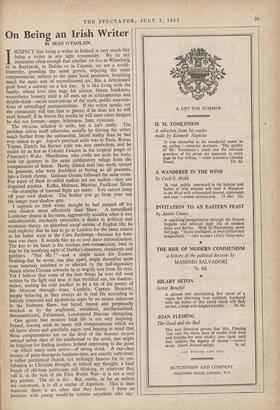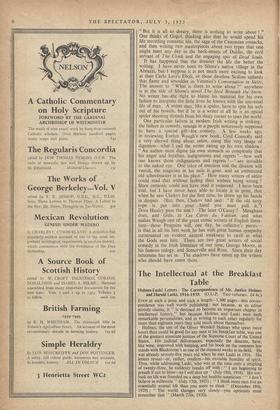On Being an Irish Writer
By SEAN 0 'FAOLA1N
ISUSPECT that being a writer in Ireland is very much like being a writer in any tight community. We do not . remember often enough that whether we live in Winesburg or in Reykjavik, in Dublin or in Catania, we are a world- fraternity, growling the same growls, enjoying the same compensations, subject to the same local pressures, breathing much the same sort of reconditioned air, like a dehydrated gush from a subway on a hot day. It is like living with the family, whose love also begs for silence, blunts frankness, exacerbates honesty until it all ends up in schizophrenia and double-think—secret reservations of the truth, public assevera- tions of subterfugal sentimentalities. If the writer speaks out the community will tear him to pieces; if he does not he will rend himself; if he braves the results he will meet other dangers he did not foresee—anger, bitterness, hate, cynicism.
The obvious solution is exile, but it isn't really. The problem solves itself otherwise, usually by driving the writer much farther from the unbearable, literal reality than he had ever meant to go. Joyce's practical exile was to Paris, Rome, Trieste, Ziirich; his literary exile was into symbolism, and he ended up as lost as Colonel Fawcett in the tropical jungle of Finnegan's Wake. Hawthorne, who could not exile his body, took up quarters in the same sublimatory refuge from the compressions of Salem. Hardy dilated man into myth, turned his peasants, who were doubtless as boring as all peasants, into a Greek chorus. Graham Greene followed the same route. For many of these so-called realists are not realists—they are disguised mystics. Kafka, Malraux, Mauriac, Faulkner, Silone —the examples of internal flight are many. You cannot jump off your own shadow. The farther you go from your sun the longer your shadow gets. I suppose no Irish writer thought he had jumped off his own shadow more effectively than Shaw. A naturalised Londoner almost in his teens, aggressively socialist when it was unfashionable, resolutely rationalist, a dealer in political and economic theory, an absorbed social satirist of English life, he said explicity that he had to go to London for the same reason as his father went to the Corn Exchange—because his busi- ness was there. It sounds like an ex post facto rationalisation. The key to his heart is his resolute anti-romanticism, bred in him by the terrifying sight of Dublin's dreamers, drunkards and gabblers. "Not Me !"—and a single ticket for Euston. Nothing that he wrote, one play apart, might thereafter seem even remotely indebted to or affected by the half-legendary Aeaea whose Circean cobwebs he so angrily tore from his eyes. Yet I believe that some of the best things he ever did were written by the light and heat of that mythical sun, his shadow- maker, melting his cold intellect to let a bit of the poetry of life blossom through—Joan, Candida, Captain Shotover; people behaving as they always do in real life according to entirely irrational and mysterious urges by no means unknown to the Irishman Shaw, but hated, feared and perpetually mocked at by the anglicised, socialised, intellectualised, deromanticised, Fabianised, Londonised Shavian changeling.
One agrees that modern Irish life is not very inspiring. Indeed, leaving aside its many rich compensations which we all know about and gratefully enjoy, and bearing in mind that these compensations are on the level of the homme moyen sensuel rather than of the intellectual or the artist, one might be forgiven for finding modern Ireland depressing to the point —at which many soon arrive—of strong drink. A one-class society of petty-bourgeois business-men, not exactly cultivated; a rather puritanical church, not strikingly famous for its con- tribution to Christian thought, or indeed any thought; a hard bunch of old-time politicians still thinking, or whatever they call it, in the vein of the First World War—it is not a very gay picture. The air is dry. But, surely, as far as writers are concerned, it is all a matter of digestion. This is their material; there is no other that they know. I have no patience with young would-be writers anywhere who say : " But it is all so dreary, there is nothing to write about ! " One thinks of Gogol, thinking also that he would spend his life recording romantic life, the saga of the Caucasian cossacks, and then writing two masterpieces about two types that one might meet any day in the back-streets of Dublin, the civil servant of The Cloak and the engaging spiv of Dead Souls. It has happened that the drearier the life the better the writing. I have never been to Silone's native village in the Abruzzi, but I suppose it is not much more exciting to look at than Carlo Levi's Eboli, or those desolate Sicilian uplands that flame and smoulder in Vittorini's Conversation in Sicily. The answer to " What is there to write about ?" anywhere is in the title of Silone's novel The Seed Beneath the Snow. No writer has .the right to blame his material for his own failure to integrate the little lives he knows with the universal life of man. A writer may, like a spider, have to spin his web out of his bowels, but if he is a writer at all he is an epical spider shooting threads from his dusty corner to span the world. One particular failure in modern Irish writing is striking : the failure in comedy, strange in a people notoriously supposed to have a special gift - for comedy. A few weeks ago, in reviewing Evelyn Waugh's new book, Cyril Connolly said a very shrewd thing about satire, using this very iniage of digestion—what I call the writer eating up his own shadow : " An author must digest his own stomach so completely that his anger and loyalties, indignations and regrets "—how well one knows those indignations and regrets ! —" are invisible to the naked eye. One trace of emotion and the illusion will vanish, the magician in his tails is gone, and an embittered old schoolmaster is in his place." How many writers of satire could read that without feeling their withers being wrung Shaw certainly could not have read it unmoved. I have been told, but I have never been, able to locate it in print, that when he saw Chekov for the first time, he threw up his hands in despair. (But, then, Chekov had said: " If the old tarry rope is put into your hand you must pull it.") Does Huxley pass the test ? The later O'Casey ? Maugham does, and Gide, in Les Cavesdu Vatican, and what makes Waugh one of the great comic writers of English litera- ture—those Penguins will, one day, be collector's pieces— is that in all his best work he has with great human sympathy surmounted an evident natural weakness to cavil at what the Gods sent him. There are two great writers of social comedy in the Irish literature of our time, George Moore, in his famous trilogy, and Somerville and Ross. Since their day bitterness has set in. The shadows have eaten up the writers who should have eaten them.



























































 Previous page
Previous page